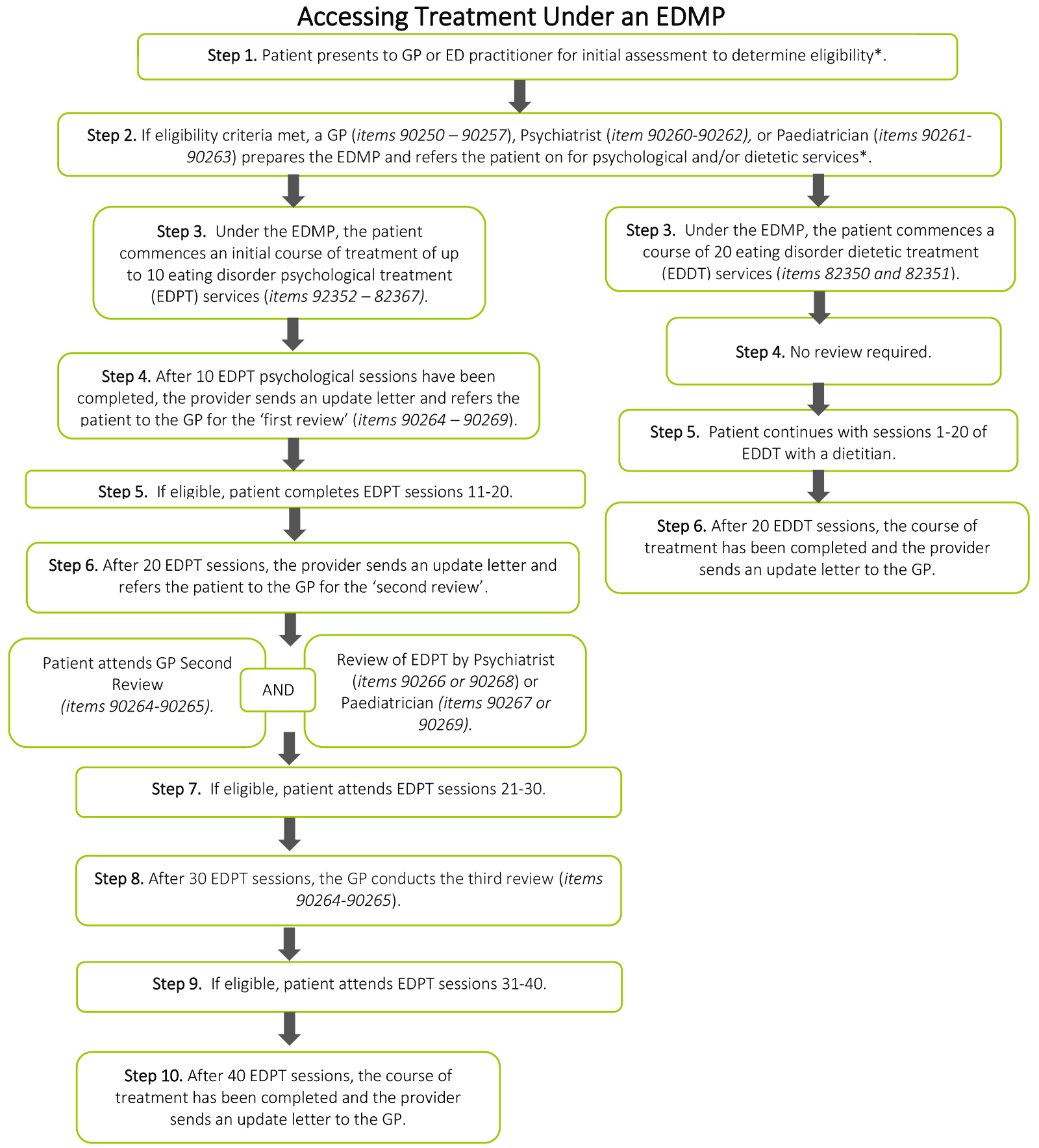Eating Disorder Specific Medicare Schedule
As of 1 November 2019, a new suite of 64 Medicare Benefits Schedule (MBS) item numbers will be available to support eligible patients with an eating disorder under an Eating Disorder Management Plan (EDMP).
Under an EDMP, eligible patients will be able to access Medicare rebates for up to 40 eating disorder psychological treatment (EDPT) sessions and 20 eating disorder dietetic treatment (EDDT) sessions in a 12-month period.
Patient eligibility criteria is listed below.
*Please note: CFIH practitioners are available to assist with the eligibility assessment process through conducting a thorough assessment, administrating and scoring the questionnaire, and providing a summary report to GPs.
There are two cohorts of patients eligible to access an EDMP:
- Patients with a clinical diagnosis of anorexia nervosa.
- Patients who meet the eligibility criteria (below), AND have a clinical diagnosis of any of the following conditions;
- Bulimia nervosa
- Binge-eating disorder
- Other specified feeding or eating disorder
Eligibility criteria for patients with diagnoses other than anorexia nervosa are:
- The person has been assessed as having an EDEQ^ score of 3 or more; and
- The person’s condition is characterised by rapid weight loss, or frequent binge eating or inappropriate compensatory behaviours (3 or more occurrences per week); and
- The person has AT LEAST TWO of the following indicators:
- Body weight less than 85% expected weight (where weight loss is directly attributable to the eating disorder);
- Current or high risk of medical complications due to eating disorder behaviours and symptoms;
- Serious comorbid medical or psychological conditions significantly impacting on medical or psychological health status with impacts on function;
- The person has been admitted to hospital for an eating disorder in the previous 12 months;
- The person has experienced inadequate treatment response to evidence-based eating disordered treatment over the past 6 months despite active and consistent treatment.
Patients who do not meet the eligibility criteria for an EDMP are still be eligible for rebates under a Mental Health Care Plan as well as a Chronic Disease Management Plan.
Please note that some patients may interpret their ineligibility for the EDMP in ways that may exacerbate their illness and/or interfere with treatment engagement. It is recommended that, in the case of ineligibility, this information is delivered with upmost caution and sensitivity.
For suggestions as to how to have this conversation with clients, see our blog on the topic.
Contrary to some misinformation that has been circulated, there has been no change to those who can provide eating disorders treatment services under Medicare, or to which professionals are eligible to treat people with an eating disorder under Medicare.
Practitioners eligible to provide Eating Disorder Psychological Treatment (EDPT) services under the EDMP are all mental health professional holding a current Medicare provider number who are currently eligible to provide focused psychological services under the Better Access program. This includes psychiatrists, GPs, clinical psychologists, psychologists, mental health social workers and mental health occupational therapists. All CFIH Psychologists are eligible to provide these services.as well as GPs..
Practitioners eligible to provide Eating Disorder Dietetic Treatment (EDDT) services under the EDMP are all suitably trained Accredited Practicing Dietitians. All CFIH Dietitians are eligible to provide these services.
The Approved Psychological Treatments to be Delivered Under Medicare:
- Family Based Treatment for Eating Disorders (EDs) (including whole family, Parent Based Therapy, parent only or separated therapy)
- Adolescent Focused Therapy for EDs
- Cognitive Behavioural Therapy (CBT) for EDs (CBT-ED)
- CBT-Anorexia Nervosa (AN) (CBT-AN)
- CBT for Bulimia Nervosa (BN) and Binge-eating Disorder (BED) (CBT-BN and CBT BED)
- Specialist Supportive Clinical Management (SSCM) for EDs
- Maudsley Model of Anorexia Treatment in Adults (MANTRA)
- Interpersonal Therapy (IPT) for BN, BED
- Dialectical Behavioural Therapy (DBT) for BN, BED
- Focal Psychodynamic Therapy for Eating Disorders
See the MBS rebates schedule here:
Further information
- Accessing Treatment Under an EDMP
- New MBS Item Numbers for Eating Disorders Explained
- Eating Disorder Examination Questionnaire
- EDE-Q Scoring
- Accessing Treatment Under an EDMP - Flowchart Summary
Resources
- New ED Specific Medicare Benefits: a Summary
- EDE-Q Printable PDF version
- DSM-V Diagnostic Critera for Eating Disorders
- GP Eating Disorder Plan Template Smart Form Download this form to complete and save it.
- EDE-Q Excel Questionnaire and Scoring
- GP EDMP Template
Related News
Do I need to write a separate EDMP for the psychologist and the dietitian?
No. Only one EDMP plan is needed.
Within that one plan, the referring doctor can specify whether the referral is to be used for eating disorder specific psychological treatment (EDPT) and/or eating Disorder specific dietetic treatment (EDDT).
What if my patient has already had a Mental Health Care Plan (MHCP) and/or Chronic Disease Management Plan (CDMP)?
If a patient has already exhausted all of the sessions available to them under a MHCP (10 sessions) or a CDMP (5 sessions) PRIOR to a EDMP being created, those appointments attended do not count toward the total number of sessions available under a EDMP (40 psych and 20 dietetics).
However, the patient accesses services under a MHCP or CDMP referral AFTER a EDMP has been created it will count toward the total number of sessions available under a EDMP (40 psych and 20 dietetics).
As a GP, how do I refer my patient to a psychiatrist as part of the EDMP review?
If you (the GP) aren’t activating an EDMP plan, and you simply want to refer your patient to a psychiatrist, then you refer to the psychiatrist as per usual.
Should the psychiatrist believe an EDMP is warranted, the psychiatrist would then claim MBS item number associated with the EDMP activation.
Does my client need to go back to their GP for a review for my Eating Disorder Management Plan (EDMP) if they have been disengaged from treatment for three or more months?
Whilst it is not a requirement of Medicare, CFIH do require that all individuals receiving treatment for an eating disorder have regular medical monitoring.
If an individual has not been engaged with treatment for 3 or more months, we require the individual to attend a review with their GP to confirm their suitability for outpatient treatment.
Can someone get a Mental Health Care Plan after their Eating Disorder Management Plan Expires?
Once the 12-month period for an EDMP expires there have several options. If eating disorder related concerns are still relevant, the individual can be assessed for a new EDMP. It is also important to note however, that no one can receive rebates for more than 40 psychological treatment sessions in one calendar year.
This means that if they have used 40 rebated sessions within one calendar year, they will need to wait until the next calendar year to redeem sessions under their new EDMP. If they have used 35 of their previous EDMP sessions in one calendar year, they can use 5 of their new EDMP sessions in that calendar year but must use all other sessions in the following calendar year.
If their EDMP expires and they would like to seek support for non-ED related concerns, they can be considered for a Mental Health Care Plan or Chronic Disease Management Plan.
Once again however, there is a maximum of 40 psychological treatment sessions allowed in a rolling and/or calendar year.
Are individuals with a clinical diagnosis of Avoidant-Restrictive Food Intake Disorder eligible for the EDP?
No.
Can my patient access the EDMP via telehealth?
Yes, patients can access all of their EDMP services via Teleheath if all the criteria below are met;
- The service provider is satisfied that it is clinically appropriate,
- Telehealth services are provided via video only (not telephone or email),
- The service provider and the patient are located a minimum of 15 kilometres apart at the time of the video consultation, and
- The patient is located within MMM classifications 4 to 7 ( click here for more information on the MMM classifications and click here to find current areas under the MMM
- Please see the MBS Eating Disorders Quick Reference Guide for more information.
Does a patient need to meet EDMP eligibility at all review points?
No. A patient does not need to meet EDMP eligibility at all review points following the creation of the original EDMP.
Assessment for ongoing use of the EDMP, rather, is a matter of clinical judgment and assessed based on factors including; the patient’s progress, patient engagement, treatment effectiveness and overall suitability.
If a patient is not approved for more sessions after session 20 of an EDMP, can I use Better Access to provide more sessions?
No. If after 20 EDMP sessions a patient is not approved for additional courses of treatment they cannot access Better Access for eating-disorder related concerns within that calendar or rolling year.
However, if a patient wishes to seek support for non-ED related concerns and has not exceeded 10 Medicare rebated psychological therapy sessions within the calendar year, they are able to seek a Mental Health Care Plan or Chronic Disease Management Plan for support with non ED-related concerns, provided they do not exceed 10 Medicare rebated sessions within the calendar year.

Contact
For more information, contact our Office Manager and MBS Item Expert, Bri.
Bri is available to answer any additional questions you have regarding referrals, Eating Disorder Management Plans or other GP Management Plans.
Phone (07) 3161 0845 | Email info@cfih.com.au


